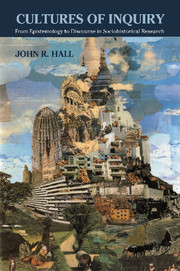Book contents
- Frontmatter
- Contents
- List of tables and figures
- Acknowledgments
- Prologue
- 1 Introduction: the Third Path
- PART I FORMATIVE DISCOURSES
- 2 Value discourse and the object of inquiry
- 3 Narrative cultures and inquiry
- 4 The conceptual possibilities of social theoretical discourse
- 5 The core of explanation and interpretation as formative discourse
- PART II PRACTICES OF INQUIRY
- Notes
- Bibliography
- Index
3 - Narrative cultures and inquiry
Published online by Cambridge University Press: 22 September 2009
- Frontmatter
- Contents
- List of tables and figures
- Acknowledgments
- Prologue
- 1 Introduction: the Third Path
- PART I FORMATIVE DISCOURSES
- 2 Value discourse and the object of inquiry
- 3 Narrative cultures and inquiry
- 4 The conceptual possibilities of social theoretical discourse
- 5 The core of explanation and interpretation as formative discourse
- PART II PRACTICES OF INQUIRY
- Notes
- Bibliography
- Index
Summary
Values are central to how inquiry is conducted, but their consideration often remains only implicit in actual research. Narrative is more obviously a formative discourse, but its status is tied to values, for narratives often engage the dilemmas of meaningful choice. The power of novels like Jane Austen's derives from how their protagonists confront conflicts between existential acts and moral implications that become apparent to protagonists and readers only as the plot unfolds. Inquiry's narratives share this capacity for moral drama with fiction, even though sociohistorical narratives are conventionally distinguished by their concern with telling “what actually happened.”
In inquiry, narrative is conventionally defined as an account draped on the framework of an overall plot that connects events, actions, and subplots to one another; textually, the plot is developed through devices such as flashbacks and cuts between different scenes that establish some kind of narrative time. Even outside history, ethnographic narratives and qualitative sociological research still embody its principal features. And within history, the textual character of the form comes through even in a highly telescoped passage concerned with religions and nations:
The prospect of a Protestant succession so alarmed Philip II that he entered into a formal alliance with the league of French Catholics created by the Guise family: the Sainte Union … There seems to be no doubt that this alliance, the treaty of Joinville (signed on 31 December 1584), frightened England.
- Type
- Chapter
- Information
- Cultures of InquiryFrom Epistemology to Discourse in Sociohistorical Research, pp. 72 - 103Publisher: Cambridge University PressPrint publication year: 1999



